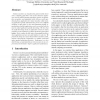Free Online Productivity Tools
i2Speak
i2Symbol
i2OCR
iTex2Img
iWeb2Print
iWeb2Shot
i2Type
iPdf2Split
iPdf2Merge
i2Bopomofo
i2Arabic
i2Style
i2Image
i2PDF
iLatex2Rtf
Sci2ools
113
click to vote
MOBISYS
2003
ACM
2003
ACM
Tactics-Based Remote Execution for Mobile Computing
Remote execution can transform the puniest mobile device into a computing giant able to run resource-intensive applications such as natural language translation, speech recognition, face recognition, and augmented reality. However, easily partitioning these applications for remote execution while retaining application-specific information has proven to be a difficult challenge. In this paper, we show that automated dynamic repartitioning of mobile applications can be reconciled with the need to exploit application-specific knowledge. We show that the useful knowledge about an application relevant to remote execution can be captured in a compact declarative form called tactics. Tactics capture the full range of meaningful partitions of an application and are very small relative to code size. We present the design of a tactics-based remote execution system, Chroma, that performs comparably to a runtime system that makes perfect partitioning decisions. Furthermore, we show that Chroma ca...
MOBISYS 2003 | Perfect Partitioning Decisions | Remote Execution | Remote Execution System | Wireless Networks |
Related Content
| Added | 24 Dec 2009 |
| Updated | 24 Dec 2009 |
| Type | Conference |
| Year | 2003 |
| Where | MOBISYS |
| Authors | Rajesh Krishna Balan, Mahadev Satyanarayanan, SoYoung Park, Tadashi Okoshi |
Comments (0)

